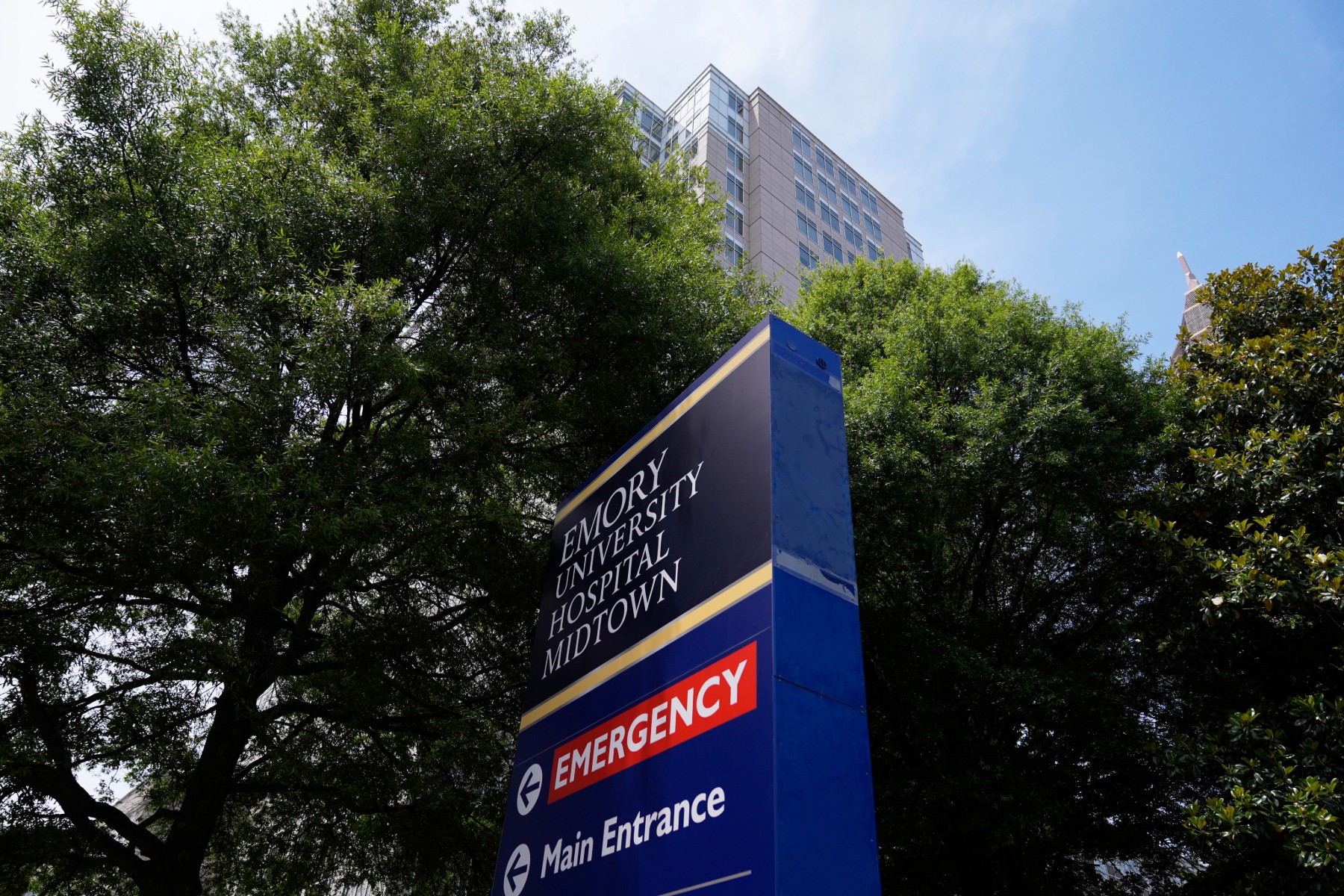Reproductive health advocates are sounding the alarm over the case of a pregnant woman in Georgia who was declared brain dead months ago but must now stay on life support, according to her family, because of the state’s strict abortion ban law.
Adriana Smith, a 30-year-old nurse from the metro Atlanta area, experienced a medical emergency in February that involved blood clots in her brain. Smith, who was about nine weeks pregnant at the time, was declared legally dead, her mother, April Newkirk, told Atlanta TV station 11Alive Action News.
Newkirk said that staff at Emory University’s network of hospitals told her they cannot remove the devices that are helping Smith to breathe because of the state’s six-week abortion ban. The staff said they are legally required to keep Smith breathing until the fetus reaches viability, Newkirk added.
“She’s been breathing through machines for more than 90 days,” Newkirk told the television station of Smith, who also has a 5-year-old son. “It’s torture for me. I see my daughter breathing, but she’s not there. And her son—I bring him to see her.”
The case puts a spotlight on the consequences of restrictive abortion bans following the 2022 overturning of Roe v. Wade, which had guaranteed a federal constitutional right to an abortion. Georgia’s abortion ban has an exception for a pregnancy that threatens the life of the pregnant person. But Smith’s case doesn’t fall under those exceptions, her family said. Since Smith is brain-dead, the pregnancy no longer poses a risk to her life. And because Smith’s fetus still has a heartbeat, the family said that she must still be kept on life support to comply with Georgia’s abortion ban.
Rep. Nikema Williams, an Atlanta-area Democrat, said in a statement Friday that Smith and her family “deserve better.”
“Everyone deserves the freedom to decide what’s best for their families, futures, and lives. Instead, anti-abortion politicians like Donald Trump and Governor Brian Kemp are forcing people through unimaginable pain,” Williams said. “Adriana’s story is gut-wrenching. It’s also a painful reminder of the consequences when politicians refuse to trust us to make our own medical decisions.”
Smith initially sought medical treatment in February for intense headaches, according to her mother. She went to Northside Hospital, where she was given medication and sent home. The following day, at her home, her boyfriend found her gasping for air. Representatives for Northside Hospital did not immediately respond to a request for comment.
Smith was then seen by and sent to different doctors throughout the Emory University hospital system, including Emory University Hospital, where she worked as a nurse. A CT scan showed blood clots in her brain. She was subsequently declared brain-dead, which means she is considered legally dead.
Smith is now 21 weeks pregnant. Newkirk said the hospital staff told her they plan to keep her daughter breathing until she is at least 32 weeks pregnant.
Representatives for Emory told the Associated Press that the hospital network could not comment on an individual case because of privacy rules but said in a statement: “Emory Healthcare uses consensus from clinical experts, medical literature, and legal guidance to support our providers as they make individualized treatment recommendations in compliance with Georgia’s abortion laws and all other applicable laws. Our top priorities continue to be the safety and wellbeing of the patients we serve.”
Alicia Stallworth, director of Georgia campaigns for the reproductive rights advocacy group Reproductive Freedom for All, called Smith’s condition “a devastating tragedy.”
“But what makes it even more unconscionable is that her family has been denied the space and dignity to grieve,” said Stallworth. “Instead of being allowed to say goodbye, they are being forced to endure an agonizing limbo because of the state’s extreme abortion ban. This is not care. This is not justice. It is a cruelty rooted in a system that refuses to see Black women as fully human, even in death.”
Newkirk told 11Alive Action News, Georgia’s NBC affiliate, that the state’s strict abortion laws have robbed her family of the choice about whether to continue Smith’s pregnancy and the ability to make decisions on their own terms. They’re now left in limbo and facing the prospect of paying for several more weeks of expensive medical care.
“I think every woman should have the right to make their own decision,” Newkirk told the station. “And if not, then their partner or their parents.”
Smith’s fetus also has fluid on his brain, Newkirk said, carrying unknown implications for his health and future.
“She’s pregnant with my grandson. But he may be blind, may not be able to walk, may not survive once he’s born,” she said.
“This decision should’ve been left to us. Now we’re left wondering what kind of life he’ll have — and we’re going to be the ones raising him,” she said.

Support The 19th
Your donation will allow us to maintain our independence and remain true to our mission to represent women and LGBTQ+ people. Together, we’ll continue to cover this ongoing American story — without fear or favor.
Members of the House Reproductive Freedom Caucus, co-chaired by Democratic Reps. Diana DeGette of Colorado and Ayanna Pressley of Massachusetts, said in a Friday statement that “there is no desensitizing to the horror of this moment.”
“Adriana’s mother spent Mother’s Day watching her daughter undergo unconscionable medical torture by orders of the state,” they said. “Her young son spent Mother’s Day thinking his mom was just asleep and will soon wake up to hold him again. There are no words that can provide clarity or comfort. There is only the promise that we will say her name until her family sees peace and justice.”
Black women face higher maternal mortality rates in the United States and in Georgia, a public health crisis that has been underscored by the loss of federal abortion rights.
Smith’s case is the latest instance in which Georgia’s six-week abortion ban and its impacts on Black women have made national news. In 2024, the investigative newsroom ProPublica reported on the cases of two other Black women, Amber Nicole Thurman and Candi Miller, who died of infections after seeking to end their pregnancies in the state. The state’s maternal mortality review committee determined that both deaths were preventable, the outlet reported.
Monica Simpson, the executive director of SisterSong, an Atlanta-based reproductive justice organization focused on women of color, is also the lead plaintiff in a lawsuit challenging the state’s six-week abortion ban. In a statement Wednesday, she noted that Smith, a registered nurse, knew how to advocate for herself and navigate the medical system. Still, she didn’t get the treatment she needed until it was too late. Black women, she said, “must be trusted when it comes to our health care decisions.”
“We’ve sounded the alarm for years,” Simpson said. “Yet, after the devastating and preventable deaths of multiple Black women, the message still rings clear: our lives are on the line, and our human right to bodily autonomy has been violated. Our bodies are not battlegrounds for political power plays.”





